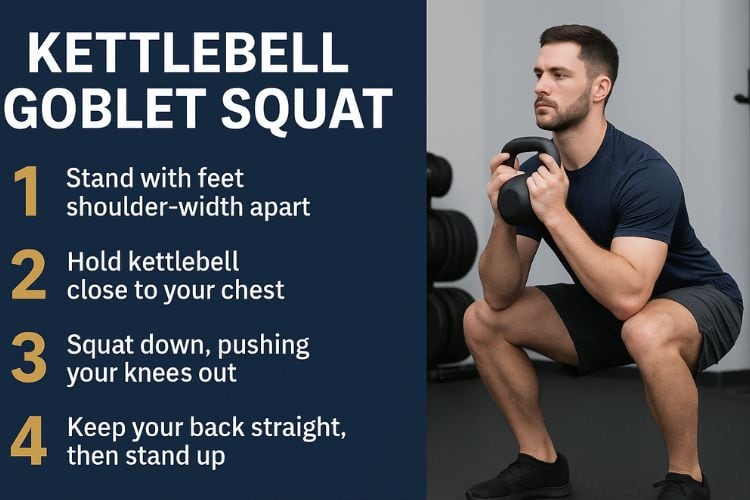
45 Minutes to Fit: A Full-Body Kettlebell Workout for All Levels
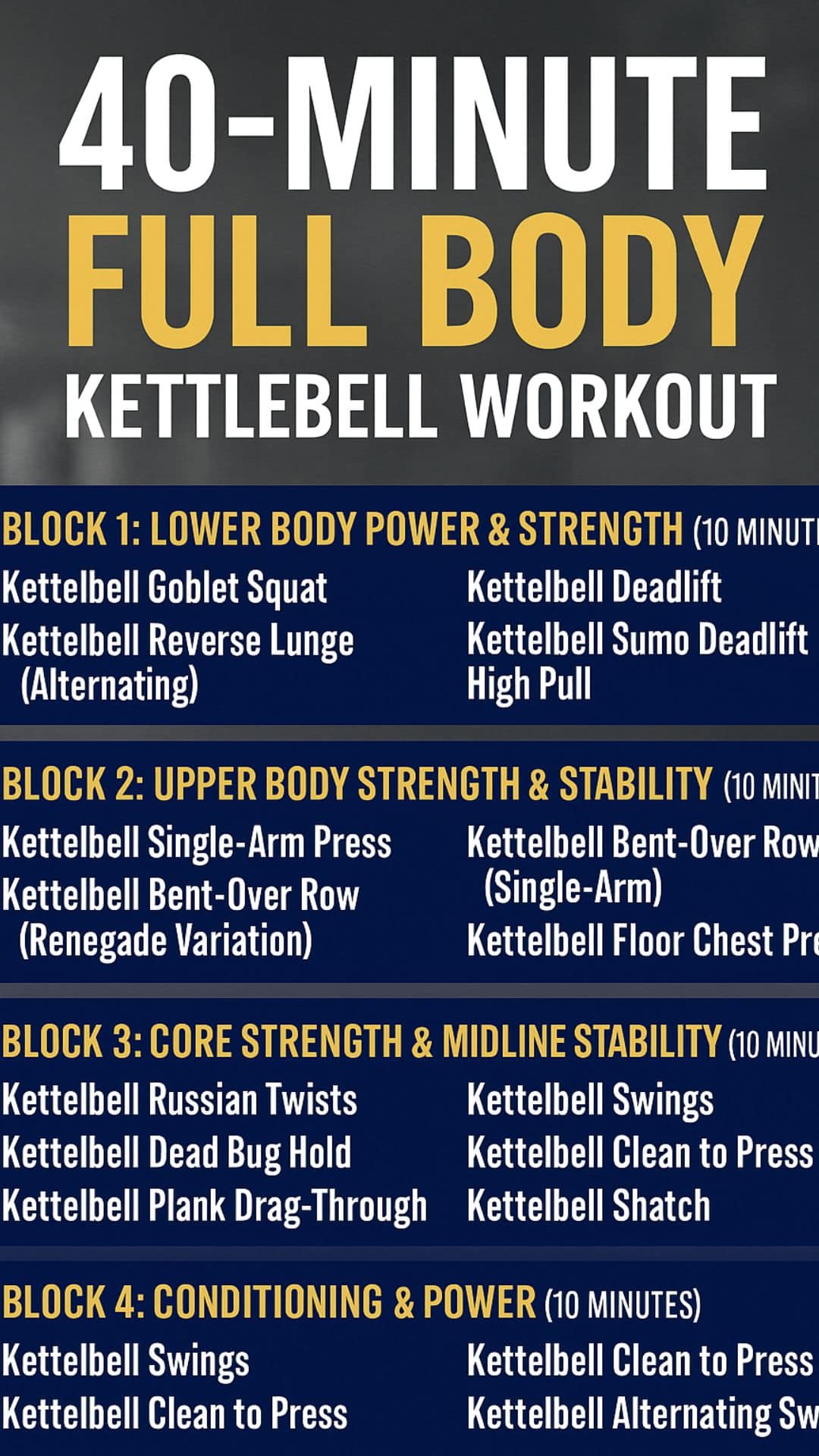
40-Minute Full-Body Kettlebell Workout (Build Muscle, Burn Fat)
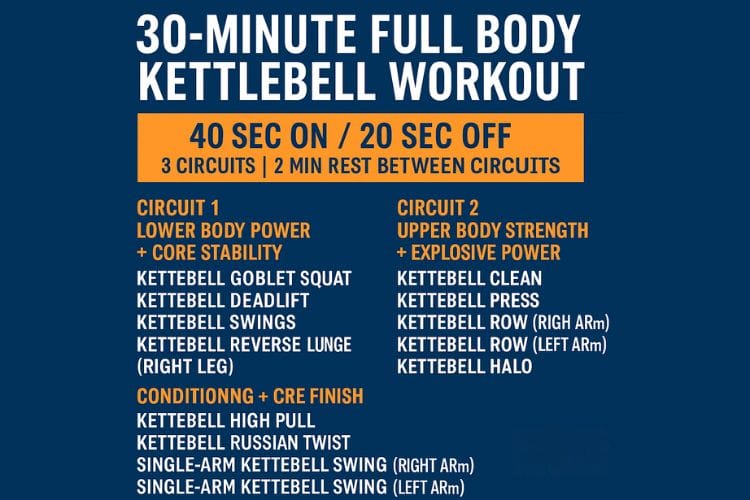
30-Minute Kettlebell Workout for Total-Body Strength
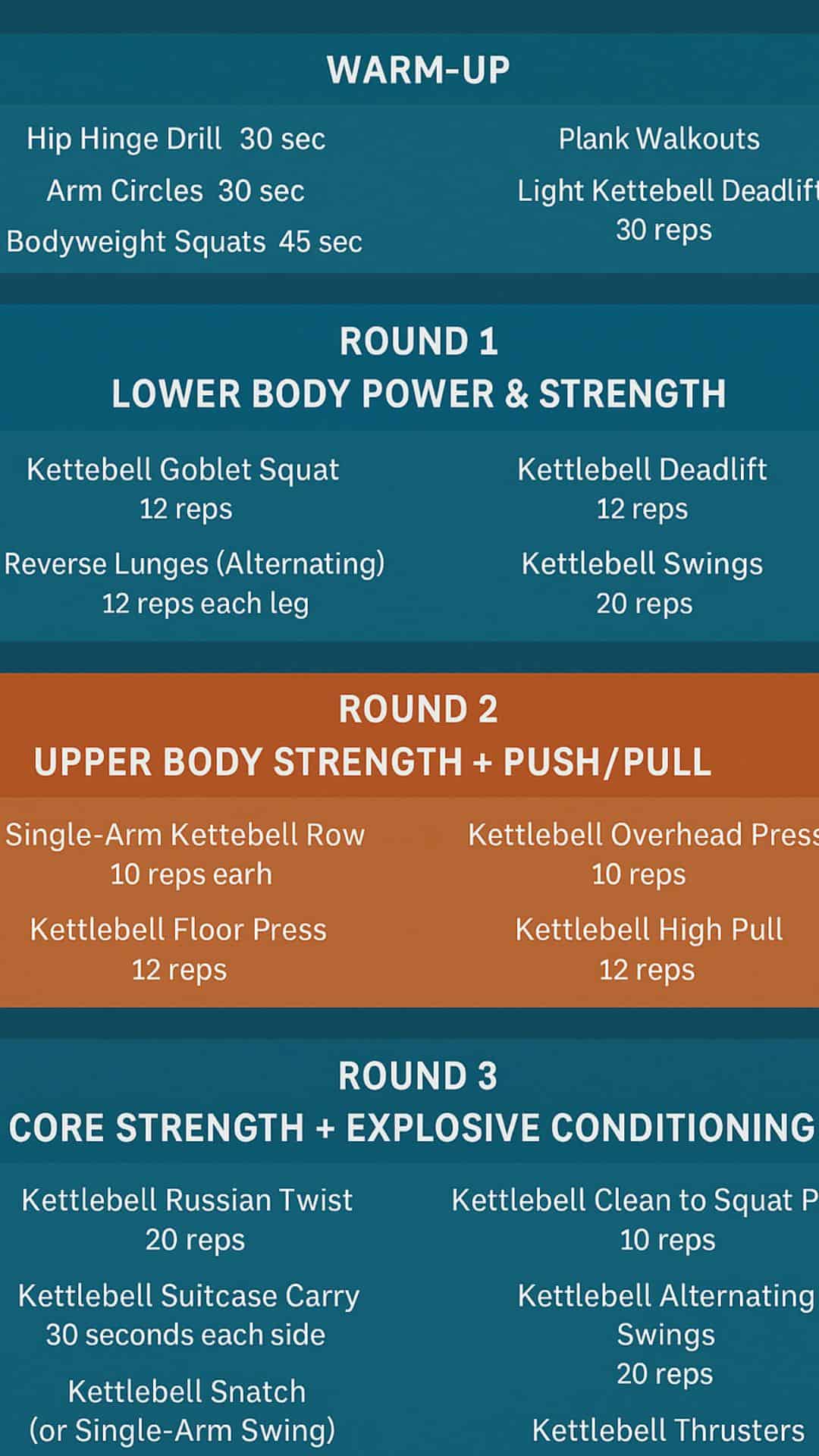
25-Minute Full Body Kettlebell Workout for Strength & Fat Loss
How To Do Goblet Squats Exercise
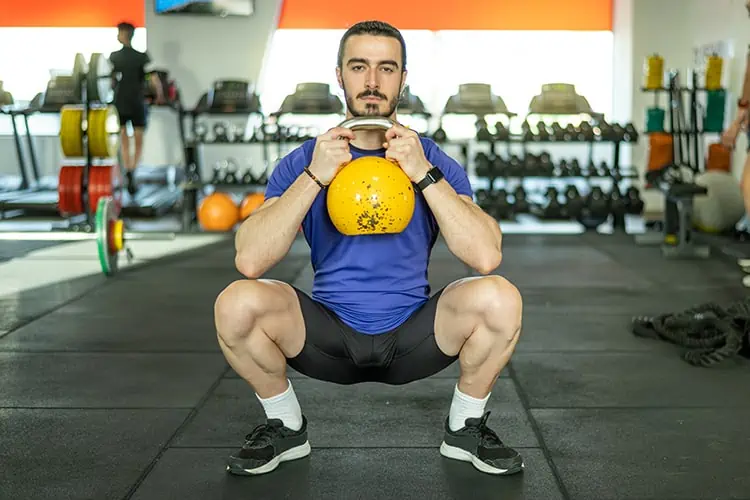
The Goblet Squat is a fantastic exercise that combines strength, flexibility, and the functionality of multiple muscle groups in a single, efficient movement. Ideal for both beginners and seasoned athletes, it offers an accessible entry point into strength training while also serving as a valuable addition to more advanced routines. This post will guide you through the benefits, techniques, variations, and common mistakes to avoid when performing Goblet Squats, ensuring you get the most out of this powerful exercise.
Your Introduction To Goblet Squats
The Goblet Squat is named for the way in which the weight (typically a kettlebell or dumbbell) is held – similar to how one might hold a goblet. This front-loaded position not only helps improve your squatting form but also increases the workout intensity for your quadriceps, glutes, calves, core, and even your arms and shoulders. It’s a compound movement, meaning it targets multiple muscle groups and joints at once, making it a highly efficient part of any workout.
Benefits of Goblet Squats
Improved Posture and Mobility
One of the primary benefits of the Goblet Squat is its ability to enhance mobility, particularly in the hips, ankles, and thoracic spine. The weighted front hold encourages a straighter spine during the squat, promoting better posture both in and out of the gym.
Enhanced Core Stability
Holding the weight in front of your chest forces your core muscles to engage deeply throughout the movement, providing a solid workout for your abdominal and lower back muscles. This increased core engagement helps in stabilizing the spine, improving your balance and overall strength.
Accessibility for Beginners
The simplicity of the Goblet Squat, combined with its focus on form and mobility, makes it an excellent choice for those new to strength training. It teaches the fundamentals of squatting without the intimidation or complexity of barbell squats.
How to Perform a Goblet Squat
Starting Position
Begin by standing with your feet slightly wider than shoulder-width apart, toes slightly turned out. Hold a kettlebell or dumbbell close to your chest, with both hands cupping the weight. Ensure your elbows are pointing down towards the floor, and your spine is in a neutral position.
The Squat
Inhale and brace your core, then bend at the hips and knees to lower your body down into a squat. Aim to get your hips below your knees, keeping your chest up and weight centered over your feet. Your elbows should come inside your knees at the lowest point, helping to push them out and maintain proper alignment.
The Ascent
Exhale as you push through your heels to return to the starting position, driving your hips forward and squeezing your glutes at the top of the movement. Ensure your core remains braced throughout the entire motion to protect your spine.
Common Goblet Squats Mistakes and How to Avoid Them
Rounding the Back
Rounding the back can put unnecessary stress on your spine. Focus on keeping your chest up and spine neutral throughout the exercise. Practicing in front of a mirror can help you maintain the correct posture.
Not Going Low Enough
To reap the full benefits of the Goblet Squat, aim for depth with your hips dropping below your knees. If mobility issues prevent you from achieving this depth, work on stretching and mobility exercises to improve your range of motion.
Letting Knees Cave In
Your knees caving in can lead to joint stress and injury. Focus on pushing your knees out, especially as you drive up from the bottom of the squat. This will also engage your glutes and outer thigh muscles more effectively.
Variations and Progressions
Weight Increases
Progressing with the Goblet Squat can be as simple as increasing the weight of the dumbbell or kettlebell you’re using. Ensure you can perform the exercise with good form before adding additional weight.
Paused Goblet Squats
Adding a pause at the bottom of the squat can increase the intensity of the exercise, further engaging your muscles and improving your control and stability.
Single-Arm Goblet Squat
Holding the weight in one hand while performing the squat challenges your core and stabilizing muscles, adding an asymmetrical element to the exercise that can further enhance balance and coordination.
Integrating Goblet Squats into Your Workout Routine
To maximize the benefits of Goblet Squats, integrating them effectively into your workout regimen is crucial. For beginners, incorporating Goblet Squats twice a week can provide a solid foundation for squat mechanics and overall leg strength. More advanced athletes might use them as a warm-up for heavier lifting sessions or as a high-rep endurance exercise and conditioning tool.
Pre-Squat Mobility Work
A dynamic warm-up targeting the hips, ankles, and thoracic spine can significantly enhance your Goblet Squat performance. Exercises such as leg swings, ankle circles, and thoracic rotations prepare your body for the range of motion required in a deep squat, reducing the risk of injury and improving your squat depth.
Super Sets with Complementary Exercises
Pairing Goblet Squats with exercises that target antagonist muscle groups or compound movements can create a balanced and efficient workout. For example, performing a set of Goblet Squats followed by a set of Romanian Deadlifts works both the anterior and posterior chains, respectively, providing a comprehensive lower body workout.
Advanced Goblet Squat Techniques
For those looking to further challenge themselves, exploring advanced techniques can provide new stimuli for continued progress.
Tempo Squats
Manipulating the tempo of the Goblet Squat by adding a slow descent, a pause at the bottom, or an explosive ascent can dramatically alter the exercise’s difficulty and focus. Slow eccentrics increase muscle time under tension, enhancing strength and hypertrophy, while explosive movements improve power and speed.
Unilateral Variations Goblet Squats
Incorporating single-leg variations of the Goblet Squat, such as the Bulgarian Split Squat with a goblet hold, challenges balance, coordination, and unilateral strength, addressing imbalances and further promoting muscle growth and functional mobility.
Addressing Plateaus and Common Challenges
Overcoming Mobility Limitations
For many, mobility limitations can hinder the ability to perform a deep, effective Goblet Squat. Incorporating specific mobility and flexibility work for the ankles, hips, and thoracic spine can gradually improve squat depth and form. Tools like foam rollers, resistance bands, and mobility balls can be invaluable in this regard.
Progression Strategies
When progress stalls, consider not only increasing the weight but also experimenting with different set and rep schemes, incorporating pauses, or varying the frequency of Goblet Squats in your routine. Understanding that progression is not linear and allowing your body time to adapt and recover is essential.
The Mental Game
Beyond the physical execution, the Goblet Squat, like any exercise, requires a certain degree of mental focus and discipline. Visualizing the movement, focusing on the muscles being worked, and maintaining a consistent breathing pattern can all enhance the effectiveness of the exercise. The mental fortitude developed through challenging workouts translates into resilience and confidence in other areas of life.
Key Takeaways
The Goblet Squat is more than just an exercise; it’s a comprehensive tool for enhancing physical fitness, mobility, and mental toughness. By understanding the intricacies of its execution, properly integrating it into your workout routine, and continually challenging yourself with advanced techniques and progressions, you can unlock new levels of strength and functionality. Remember, the journey of fitness is ongoing, and the Goblet Squat is a valuable companion along the way, offering endless opportunities for growth, challenge, and achievement. Whether you’re lifting a light kettlebell for the first time or mastering advanced variations, the Goblet Squat has a place in everyone’s fitness journey.
Most Recommended
Subscribe to our Newsletter
Stay up to date on the latest men’s health, fitness and lifestyle trends and tips.
About Us
Men’s Fit Club was started with the goal of empowering men to get the most out of their lives. This meant going beyond exercise and diet tips to really address the broad range of issues that men face on a daily basis – topics like recreation, finding love, sexual health and even sound fashion advice.
Quick Links
© COPYRIGHT MEN'S FIT CLUB 2026. All Rights Reserved

